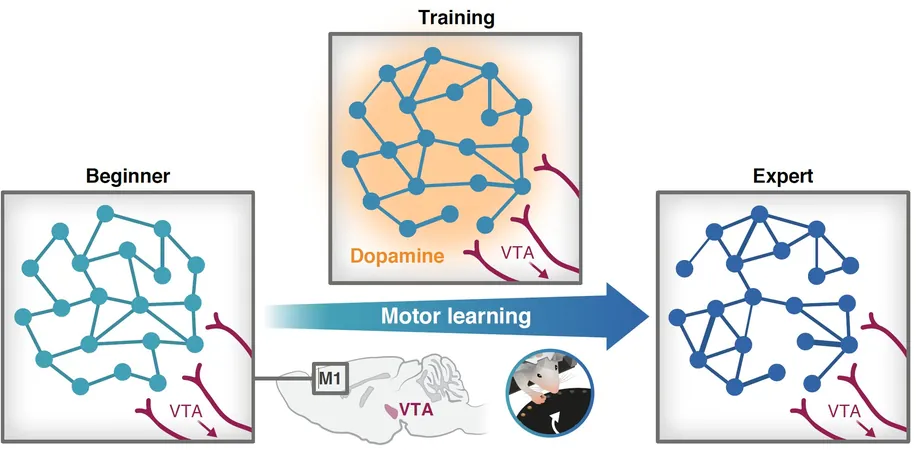
Breakthrough Study Reveals Dopamine's Secret Power in Mastering Motor Skills
2025-04-01
Author: Daniel
A groundbreaking interdisciplinary research initiative from the Technion’s Ruth and Bruce Rappaport Faculty of Medicine and the Andrew and Erna Viterbi Faculty of Electrical and Computer Engineering has unveiled an astonishing discovery: dopamine, a molecule primarily recognized for its pivotal role in the brain’s reward system, is crucial for acquiring new motor skills.
Whether it’s writing, typing, playing musical instruments, or engaging in sports, mastering movement-based tasks challenges the brain in complex ways. This illuminating new study sheds light on how our neural networks adapt and reorganize during skill acquisition, emphasizing dopamine’s integral role throughout this process.
Published in *Nature Communications*, this research was spearheaded by Dr. Hadas Benisty, Prof. Jackie Schiller, and M.D./Ph.D. student Amir Ghanayim, with additional contributions from Prof. Ronen Talmon and student Avigail Cohen-Rimon. Their findings have significant implications for our understanding of motor control and brain function.
Key Insights into Motor Skill Learning
The brain's primary motor cortex is the command center for planning and executing voluntary movements. As we learn new skills, the neural activity within this region changes dynamically, but the underlying mechanisms have remained largely elusive until now.
Utilizing advanced calcium imaging techniques on behaviorally engaged mice, along with innovative chemogenetic approaches to temporarily deactivate specific brain cells, researchers meticulously tracked changes in the neural networks within the motor cortex. They revealed a fascinating transformation in these networks, evolving from a "beginner" configuration to an "expert" framework during the skill acquisition process.
A central finding of this research is the dependence of these changes on the local release of dopamine within the motor cortex. When dopamine is released by neurons originating from the ventral tegmental area (VTA)—a well-known dopamine-producing hub—it's hypothesized to kickstart crucial plasticity mechanisms. This promotes changes in functional connectivity among neurons, essentially allowing the brain to reinforce and store newly learned motor skills.
The Impact of Dopamine Blockage
To comprehend the necessity of dopamine in this context, researchers conducted experiments that involved blocking dopamine release in the primary motor area. The results were striking: without dopamine, the mice exhibited a complete halt in learning, showing no improvements in a forelimb-reaching task, as the neural network remained unchanged. Remarkably, once dopamine release was reinstated, learning resumed, along with the reorganization of the neural circuits.
Moreover, an intriguing aspect of the study revealed that blocking dopamine did not impede the performance of skills previously acquired. This distinction highlights dopamine’s essential role in learning new movements while confirming that it is not necessary for executing learned skills.
Implications for Future Research
This study marks a significant advancement in our understanding of brain plasticity and the intricate processes underlying learning at both cellular and network levels. These findings could pave the way for innovative treatment strategies for neurological disorders, such as Parkinson's disease, where dopamine production is compromised, adversely affecting motor skills acquisition.
As we continue to unravel the mysteries of how our brains adapt and refine motor functions throughout life, this research opens new doors to enhancing rehabilitation techniques and improving the quality of life for those with motor impairments. In essence, dopamine is not just a feel-good hormone; it is a critical player in the mastery of our movements. Get ready to rethink what you know about learning and motor skills!



 Brasil (PT)
Brasil (PT)
 Canada (EN)
Canada (EN)
 Chile (ES)
Chile (ES)
 Česko (CS)
Česko (CS)
 대한민국 (KO)
대한민국 (KO)
 España (ES)
España (ES)
 France (FR)
France (FR)
 Hong Kong (EN)
Hong Kong (EN)
 Italia (IT)
Italia (IT)
 日本 (JA)
日本 (JA)
 Magyarország (HU)
Magyarország (HU)
 Norge (NO)
Norge (NO)
 Polska (PL)
Polska (PL)
 Schweiz (DE)
Schweiz (DE)
 Singapore (EN)
Singapore (EN)
 Sverige (SV)
Sverige (SV)
 Suomi (FI)
Suomi (FI)
 Türkiye (TR)
Türkiye (TR)
 الإمارات العربية المتحدة (AR)
الإمارات العربية المتحدة (AR)